“As long as the roots are not severed, all is well. And all will be well in the garden.”
|
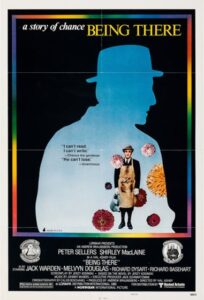
Synopsis:
When a mentally challenged gardener (Peter Sellers) is forced to leave his lifelong home after his guardian’s passing, he is accidentally hit by a car owned by a wealthy woman (Shirley MacLaine) who takes him to her mansion to receive medical help and meet her dying husband (Melvyn Douglas). “Chance” (Sellers) — referred to by the couple as “Chauncey Gardener” — quickly impresses MacLaine and Douglas with his forthright simplicity, and an opportune meeting with the president (Jack Warden) gives him instant fame. What will Chance’s future hold in store for him and the nation?
|
|
Genres, Themes, Actors, and Directors:
- Hal Ashby Films
- Intellectually Disabled
- Melvyn Douglas Films
- Millionaires
- Mistaken or Hidden Identities
- Peter Sellers Films
- Richard Basehart Films
- Shirley MacLaine Films
Review:
Hal Ashby’s adaptation of Jerzy Kosinski’s novel became Peter Sellers’ swan song — his next-to-last film before dying from a heart attack at the age of 54. Thankfully, it’s a fitting and honorable role for Sellers, allowing him to portray a much wiser, less hectic character than usual — someone able to pass his unique gifts along simply by being himself. There’s a surprising amount of humor gleaned from the central premise of Chance being an interpretive slate for whatever people choose to make of his utterings; only his former colleague (Ruth Attaway) knows how “feeble-minded” he really is, and just one other person — Douglas’s doctor (Richard Dysart) — suspects anything. Caleb Deschanel’s cinematography perfectly captures the grandeur of the Rands’ existence in a truly palatial mansion, large enough to house a hospital unit within it. Chance’s chance meeting with MacLaine can easily be seen as a divine — perhaps even Biblical — opportunity to allow Americans to connect in an out-of-the-box way; we may need our own “Chauncey Gardener” right around now to help heal our nation…
Redeeming Qualities and Moments:
- Peter Sellers as Chance
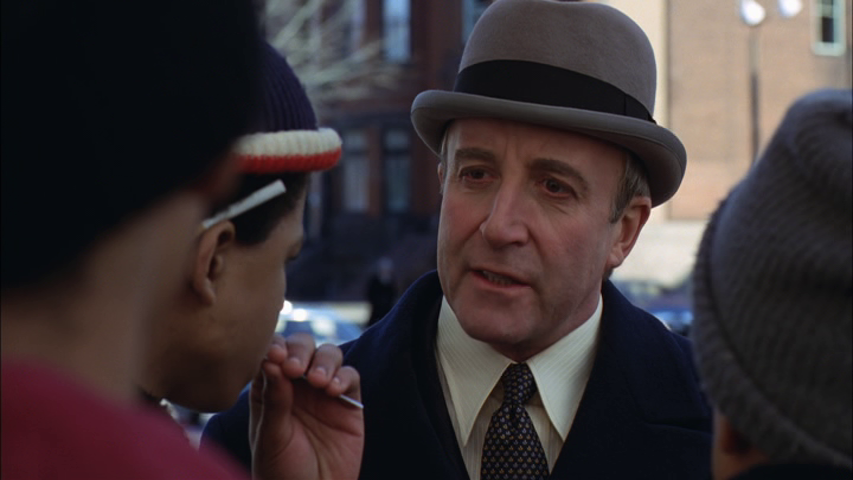
- Shirley MacLaine as Eve Rand
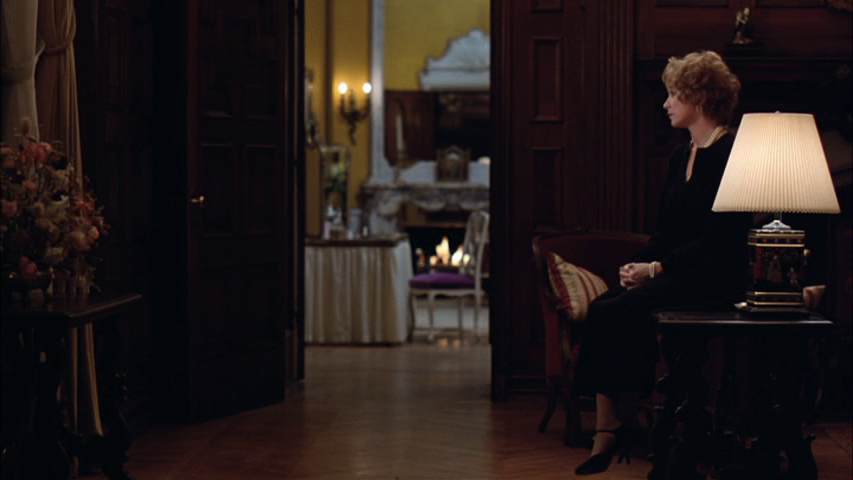
- Melvyn Douglas as Ben Rand
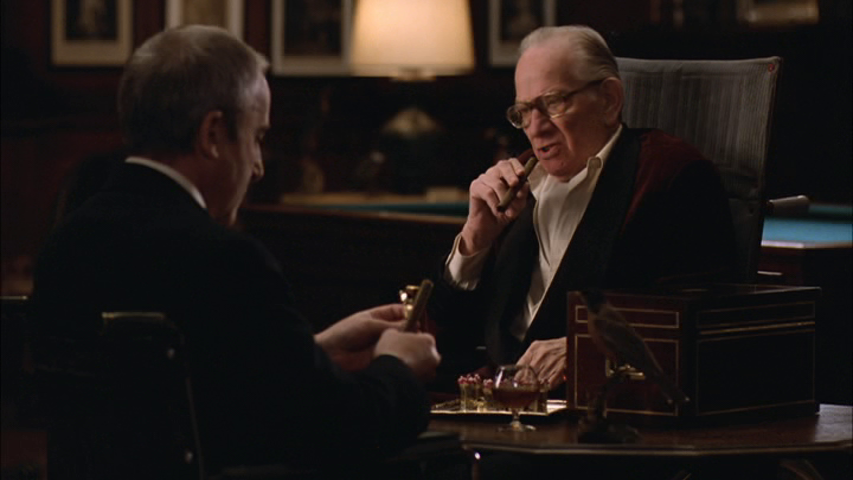
- Caleb Deschanel’s cinematography
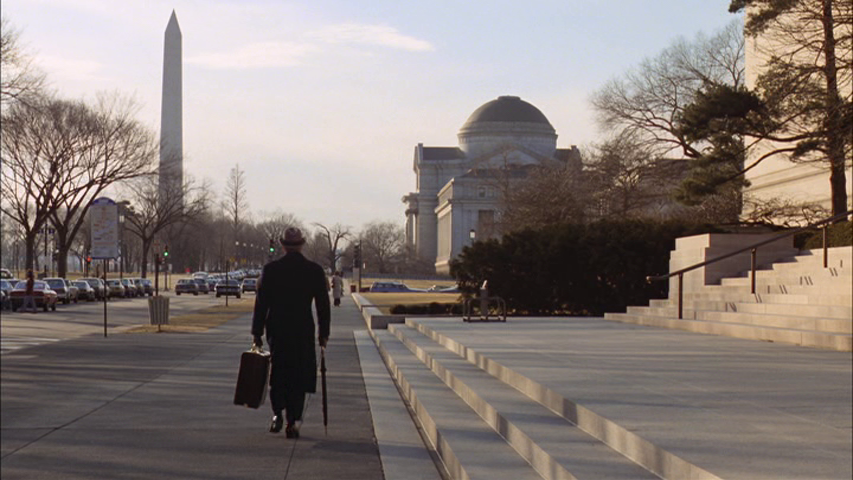
Must See?
Yes, for Sellers’ performance and as an all-around good show.
Categories
- Noteworthy Performance(s)
- Oscar Winner or Nominee
(Listed in 1001 Movies You Must See Before You Die)
Links:
|





2 thoughts on “Being There (1979)”
⭐️⭐️⭐️ out of ⭐️⭐️⭐️⭐️
Not seen this since HBO circa 1980-81 but remember it quite well. An interesting idea with a great central performance. Seemed like a minor film at the time and it seems to have sort of fallen by the wayside since.
Good, but not of any great historical or artistic significance so not must see.
A no-brainer must-see, as one of the best films of the ’70s. As per my post in ‘Film Junkie’ (fb):
“Since he’s been around, the thought of dying has been much easier for me.”
‘Being There’: 40 years on, Hal Ashby’s socio-political satire remains as fresh as ever – and it can still just as easily be misunderstood. Or let’s say it can be appreciated on different levels – but, however you interpret it, it’s still a fantasy; more like a fairy tale than its realistic setting lets on. Giving new meaning to ‘idiot savant’, Peter Sellers (in one of his best performances) plays a man who was born into this world and then promptly, completely ignored. He somehow came under the wing of a rich man and developed one skill: taking care of gardens. But the rich man dies, leaving Chance (Sellers) loose in the world. Serendipity thrusts him into the life of a business mogul (deservedly Oscar-winning Melvyn Douglas) and his wife (a subdued Shirley MacLaine). What happens from that point on cements the film as a parable.
‘BT’ is based on a Polish book plagiarized by Jerzy Kosinski – who is credited with the screenplay. However, Ashby had rejected Kosinski’s submitted script and, instead, turned to a regular collaborator (Robert C. Jones – editor of ‘Shampoo’, co-editor of ‘Bound for Glory’ and ‘The Last Detail’, co-writer of ‘Coming Home’) for the script he ultimately shot. Ashby’s production team chose brown as the dominant color, playing up the film’s garden metaphor.
But, above the rich visuals (including such subtleties as graffiti: “America ain’t shit cause the white man’s got a god complex.”), it’s the film’s text that calls for close attention. A superficial reading of the film would point to all of the characters surrounding Chance as gullible dupes (in spite of their intelligence). That reading doesn’t really work for this kind of fairy tale. But a conduit explanation does. Despite the film’s miraculous final image (which surprises Chance as much as it does the viewers), the gardener is not God. All along, the film has inferred its meaning in its title, by cleverly not starting with the indefinite article “A”.
What I find most powerful about the film (especially now) is its prescient view of where our government would lead (i.e., “The way things are going, they’ll probably legislate the medical profession, as we know it, right out of existence.”). ‘BT’ is not all that overt in its political stance – but, in talking with the President (played by Jack Warden), Douglas’ character could easily be talking to Joe Biden when he warns about the danger of “play[ing] around with temporary measures.”
I find this to be a brilliant film – masterfully directed and with sharp performances across-the-board (I also esp. like almost-unrecognizable Richard Basehart’s lively cameo as a Soviet ambassador).